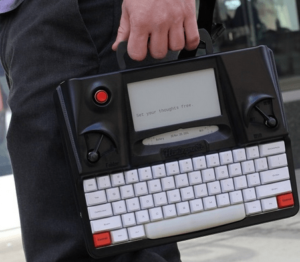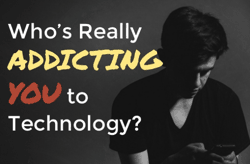
Four minutes into pitching the wonders of his invention to an influential reporter, Patrick Paul gets hit with the kind of snarky comment startup entrepreneurs dread.
Paul is the founder of Hemingwrite, a “distraction free writing tool with modern technology like a mechanical keyboard, e-paper screen and cloud backups.”
At first glance, the Hemingwrite could be mistaken for an old-school typewriter inlaid with a Kindle display. Despite its “modern technology,” it looks like a 1980s throwback from Radio Shack. Two gaudy dials sit on either side of chunky black plastic and a huge red button — which could easily be mistaken for an ignition switch — turns it on.
The company website calls this esthetic “retro.”
Despite its looks, the Hemingwrite has struck a nerve.
The company quickly surpassed its $250,000 crowdfunding goal on Kickstarter and sold hundreds of units of a machine that hasn’t even been manufactured yet.
At $399 a pop, the Hemingwrite costs much more but does much less than just about every personal technology on the market.
But that, according to the company, is exactly the point.
Less Technology More Productivity
By design, the Hemingwrite has no web browsing, no social media functionality, and no apps. The device promises to “set your thoughts free” by reducing distraction and is for people who have ever said to themselves “I get distracted too easily,” or find it difficult to focus amid all the pings, buzzes, and notifications that come with working on a PC.
Paul tells a tech reporter, “With the Hemingwrite, we burn that bridge. There is no way to get on Facebook, Reddit, or Twitter. You can only write.”
Then comes the snark…
The reporter quickly retorts, “Right, unless you pull your phone out of your pocket.” (Insert Homer Simpson-esque “D’oh!” here.)
Tech Versus Tech
Maybe the Hemingwrite isn’t for everyone. However, it is an example of a new breed of products designed to help us regain control over digital distractions.
To some, the idea of using a dumbed-down distraction free word processor is silly. Why buy an expensive box that does less than a PC?
The answer for many bleary-eyed workers is: because I need to get stuff done.
Jonathan Franzen, the man Time Magazine calls the “Great American Novelist,” uses a distraction free tool to write his masterful works — though his is homemade.
According to a 2010 cover story, “He uses a heavy, obsolete Dell laptop from which he has scoured any trace of hearts and solitaire, down to the level of the operating system. Because Franzen believes you can’t write serious fiction on a computer that’s connected to the Internet, he not only removed the Dell’s wireless card but also permanently blocked its Ethernet port. ‘What you have to do,’ he explains, ‘is you plug in an Ethernet cable with superglue and then you saw off the little head of it.’”
Technology should serve us – we should not serve it. Let’s keep our tech in check by learning how to stop checking our phone at the wrong time:
You’re Stuck in an Unhealthy Rut
In a University College London study, participants were asked to sit at a computer and direct a cloud of dots.1Nobuhiro Hagura, “Humans Are Hard-wired to Follow the Path of Least Resistance,” Science Direct, February 21, 2017, https://www.sciencedaily.com/releases/2017/02/170221101016.htm. They were instructed to move a lever to the right if a dot cloud was moving right and to the left if a dot cloud was moving left. Participants did this with accuracy. That is, until researchers added a weight to one side of the lever making it harder to move one way. The result? Participants began moving the lever in the wrong, yet easier, direction.
As the task became more difficult, participants subconsciously changed how they played the game. This study supports research from evolutionary biologists who argue humans have evolved to avoid energy consuming tasks by taking the path of least resistance.2Luke Strotz et al., “Metabolic Rates, Climate and Macroevolution: A Case Study Using Neogene Molluscs,” Proceedings of the Royal Society B: Biological Sciences, August 22, 2018, … Continue reading
Doing what we know we should do is often hard. If we fall into a routine of avoiding discomfort by taking too many breaks, we learn it’s easier to break our focus than do what we know we should. As the dot study shows, we quickly learn how to avoid discomfort by changing the game.
Henry Ford said, “Thinking is the hardest work there is, which is probably the reason so few engage in it.” If checking email for a quick minute takes the pressure off having to think through a big assignment at work, you’ll keep clicking away if you don’t have the tools to realize and deal with the difficulty. If you don’t change your ways, you’ll soon carve a mental rut that teaches your brain to automatically escape hard work instead of working through it. Note also that research has shown that staying focused gets harder with age.
Tech Versus Tech
You Don’t Know How to Focus on Things You Dislike
If you like doing something, you are more likely to do it. If you enjoy shopping for instance, you’ll seek out opportunities for “retail therapy.” However, if you find shopping to be a burden, you will avoid it unless absolutely necessary.
Unfortunately, many things you need to do in life aren’t particularly enjoyable. Few people enjoy doing their taxes, but they need to get it done nonetheless. When you don’t enjoy a task, you’re more likely to seek an escape and lose focus. How then, do you stay focused doing something you dislike?
Ian Bogost, a professor at Georgia Tech and a professional video game designer, argues that we have the power to reimagine tasks to make them more enjoyable.3Ian Bogost, Play Anything (Washington: Perseus Books Group, 2016). In his book, Play Anything, Bogost challenges readers to tackle daily tasks with the same discipline and focus used to play a game. Bogost states that we should focus more intensely on the task at hand rather than concentrating on the end result or reward.
Bogost highlights this theory using his attempt to make lawn mowing more enjoyable. To learn to enjoy the job of cutting his grass, Bogost focused more intensely on it. He learned everything he could about the practice and challenge himself to find the variability in the activity. For instance, he sought to find the optimal path for cutting the grass or beating his previous time. By reimagining a task, you can make anything more enjoyable and intrinsically rewarding.
Latest Tech Trends Designed To End Distractions
In the battle for attention, the only solution may be periodic forced amputation from the Net.
Franzen is not alone in devising ways to kill distraction.
A software developer named Ned Batchelder published code for an app he created to restrict his use of the very site he posted to. Stack Overflow, a site known to nearly every programmer on the Web, has comment strings related, “How can I keep from getting addicted to Stack Overflow?” The site even has built-in breakers to prevent overuse. According to Stack Overflow co-founder, Jeff Atwood, “The current system is designed to reward continued participation, but not to the point that it creates obsession. Programmers should be out there in the world creating things too.”
Attention Retention
Given the growing need, technologies that help people stay focused and improve their productivity so they can do the things they really want to do could be a boon for entrepreneurs and investors.
These technologies could be the social antibodies we’ve been waiting for.
A host of new products have recently come to market offering respite from the constant barrage of attention-sucking diversions like email, news sites, and social media.
They promise to keep us focused so we can actually get work done instead of mindlessly checking and pecking at our screens.
I’m eagerly awaiting these new technologies that seek to fix the flaws of old technologies. However, like any nascent trend, I anticipate there will be many failures before we’ll see any big successes.
The biggest problem with these technologies is that they don’t exhibit many of the important traits found in products that change behavior for good.
For one, they’re not fun to use.
Facebook, Twitter, Pinterest, and Instagram, among other habit-forming technologies, changed users’ daily routines by being inherently enjoyable. I worry many of the products attempting to keep us focused are things people feel they have to use instead of want to use. Pasting-on cheesy game mechanics like points and badges won’t solve the problem, but my guess is that products that can make focused work easier and more enjoyable will succeed.
To be clear, my doubts aren’t fatal flaws, just challenges I’m sure smart innovators will overcome. Of course, predicting the market potential of this new breed of products is nearly impossible, but over the next few years I expect to see many more companies emerge to help us live and work better by helping us put technology in its place.
Want to learn how you can keep your tech in check? Download my presentation and learn why people check their technology at the wrong times and the simple trick to stop it:
What Do We Call It?
Here’s where I need your help …
- What tools or products do you use to stay focused? Let’s start a list of the best tools and techniques in the comments section below.
- There still isn’t a name for this industry – yet! Here are some of my ideas: concentration technology, attention tools, anti-distraction devices, focus tech. I’m sure you can do better. What do you think we should call it?
Leave an idea in the comments section below.
Related Articles
- Schedule Maker: a Google Sheet to Plan Your Week
- Habit Tracker Template in Google Sheets
- The Ultimate Core Values List: Your Guide to Personal Growth
- Timeboxing: Why It Works and How to Get Started in 2024
- An Illustrated Guide to the 4 Types of Liars
- Hyperbolic Discounting: Why You Make Terrible Life Choices
- Happiness Hack: This One Ritual Made Me Much Happier
References

